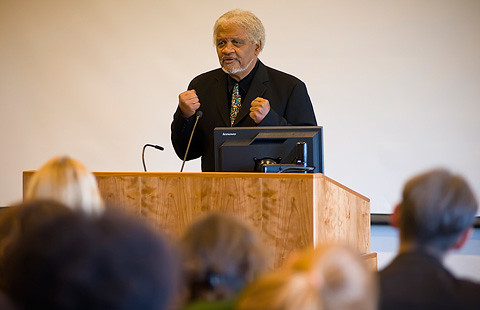Colgate students and faculty gathered last week to listen to a wide-ranging talk by Ishmael Reed, the novelist, poet, essayist, and playwright who is often called one of the most influential African American writers of his generation.
Reed’s well-known works include Mumbo Jumbo, Yellow Back Radio Broke-Down, and The Freelance Pallbearers. Besides his writing, Reed also has a passion for music. He plays piano and has collaborated with jazz musicians on three CDs, Conjure 1,2,3
 |
| Author Ishmael Reed speaks in the Ho Lecture Room in Lawrence Hall. (Photo by Andy Daddio) |
Reed, 70, talked about his early years and the difficulties he faced in finding inspiration in the traditional Western canon. While studying at the University of Buffalo, Reed said that the authors he studied were all white males – there were no women or authors of different ethnicities represented.
He and his colleagues rebelled against these conventions in their own writing.
“We felt that our work should stand on our own. We were not interested in imitating the Western canon,” said Reed.
Reed turned to other sources for inspiration. He studied different indigenous African languages, including Yoruba, which he said helped him truly discover African culture.
The author spoke about his time in New York City during the 1960s, sharing anecdotes of encounters with prominent figures of the time such as Tennessee Williams and Norman Mailer.
During his time in New York City Reed joined a collective of up-and-coming writers, the Umbra Writers Workshop. He said the group was looking for inspiration, and he urged today’s students to find their inspiration through America’s diverse cultures.
“I think we’re fortunate in this country because we can draw on all these resources,” said Reed.
Reed was introduced at Thursday’s lecture in the Ho Lecture Room by Mel Watkins ’62, NEH Professor of Humanities.
Watkins, a former editor at the New York Times Book Review, has been a friend of Reed’s for many years. In fact, Reed said that it was Watkins’ review of his book Mumbo Jumbo in the Times that helped establish him as a writer.